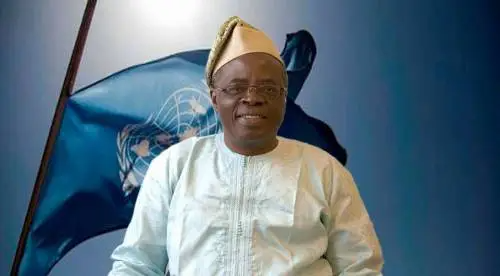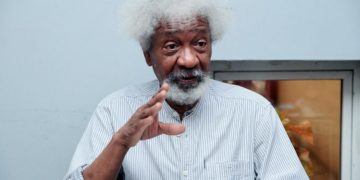Professor of Political Science and International Relations, Chrisland University, Prof Babafemi Badejo, has called on the federal government to prioritise domestic realities in its agenda setting for foreign policy and international relations.
He emphasised that achieving utmost freedom and improving the lives of the people should be the primary focus in pursuing sound economic policies and utilising looted funds to benefit the nation.
Prof Badejo who is also the former head of Political Affairs, UN-AU Mission in Darfur (UNAMID) stated this while delivering a lecture titled: “Utmost Freedom: The Real Essence of National Interest” at the Nigerian Institute of International Affairs (NIIA) seminar series in Abuja yesterday.
He stressed the need to review Nigeria’s foreign policy to align it with present-day realities and regain its weakened global influence.
He said internal stability is crucial for the country to play a meaningful role in shaping regional and global developments beyond superficial involvement.
According to him, “The domestic dimension to realising utmost freedom is very critical and has suffered neglect over the years. The answer is not crying for foreign direct investment when so much looted funds from Nigeria are sitting in vaults around the world and being used to develop other countries.
“It is also expedient that Nigeria’s foreign policy is reviewed to suit present day realities. It is imperative to build productive capacities locally or internationally. Nigeria’s weakened global influence needs to be revisited.
“If Nigeria deserves to contribute meaningfully in shaping regional and global developments beyond tokenistic involvement, it needs to get its internal stability right. Nigeria cannot afford to be seen to be suffocated by many internal challenges, hence incapable of global relevance.”
Regarding Nigeria’s approach to friendship in the international community, Prof Badejo urged a re-examination of the basis for engagement with other countries or regions.
He emphasised that national interest should prioritise concrete human needs, leading to the pursuit and safeguarding of utmost freedom for citizens.
The professor highlighted the importance of responsible governance and good leadership in the pursuit of utmost freedom.
He said leaders must vehemently oppose corruption, and effective governance should be approached holistically, considering both local and international dimensions.
Regarding external dynamics, Prof Badejo emphasised the competitive nature of international relations.
He said, “Leadership that eschews corruption and really fights against corruption will help a nation in its pursuit of utmost freedom. Even though the importance of good governance has continually received attention among citizens, it should be done holistically, considering both the local and international dimensions.
“Of importance are also the external dynamics that nation-states face. It is a dog-eat-dog situation at the international level. Nigeria/African State(s) must operate in handling collaboration, competition, and conflictual situations with respect to their respective interests vis-à-vis others.
“Building viable integration institutions within Africa and beyond are useful for leveraging interests at the international level.”
He suggested that Nigeria and other African states must handle collaboration, competition, and conflictual situations with respect to their respective interests.
He said building viable integration institutions within Africa and leveraging the continent’s resources are crucial for achieving peace, security, development, and respect for human rights.
In another context, Prof Badejo appreciated the efforts of Prof Eghosa Osaghae in pushing the Nigerian Institute of International Affairs (NIIA) towards new heights.
He urged the NIIA to focus on promoting the Universal Declaration of Human Rights (UDHR) and Sustainable Development Goals (SDGs) to improve national capacities and realise utmost freedom.
Badejo encouraged the NIIA to address the impact of external dynamics on Nigerians and their chances at utmost freedom while fostering a deep relationship with the National Intelligence Agency.
He emphasised that the NIIA should act as a catalyst in situations of national challenges, promoting consciousness among Nigerians to strengthen the nation’s strive for freedom.
Seeing utmost freedom as the essence of national interest, he said NIIA can play a vital role in domesticating foreign relations and translating abstract terms into tangible impacts on the lives of Nigerians. By doing so, the NIIA can contribute significantly to the nation’s development and progress.
According to him, “The NIIA should intensify efforts on bringing to bare, the full impact of external dynamics, and the unbalanced effect of this on the lives of Nigerians and chances at utmost freedom. This is not a call to deal with the world. That is an arduous task I will be unrealistic to call for.
“How have some of the Asians succeeded, especially deftly avoiding asphyxiation by greater powers that would want Africa to continue as hewers of wood and drawers of water for the rest of the world.
“A deep relationship with the National Intelligence Agency could yield fruitful results. How these relationships are done is not important for Nigerians. Outcomes are most important.
“The NIIA is not to undertake all tasks necessary for the realisation of utmost freedom. It can nonetheless, act as a catalyst in a situation of national morass. For instance, it’s good if we can at least provide much of our food.
“But that is not enough, in as much as we have to pay through the nose for manufactured goods in a capitalist consumerism that has been foisted on us through soft power and consumerism, we all cherish and pay heavy premiums for.
“NIIA is not going into agriculture. It is only for it to proactively re-orientate Nigerians towards a consciousness on the fact that we cannot flourish externally if we remain weak in the national strive for utmost freedom.”
He added that the NIIA, seeing utmost freedom as the essence of national interest, will be domesticating foreign relations hence transforming hitherto abstract terms into a real one showing the impact on the lives of Nigerians.











